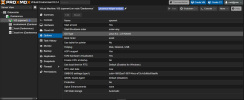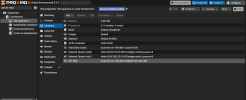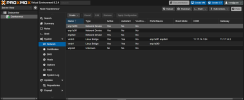I recently installed another 32 GB of RAM into my system, and now my NIC is going offline? It's strange because my Proxmox host still shows the device listed when I run ip a and such. My Modem doesn't show my host NIC being connected at all though... Reviewing the system logs shows this below before I can no longer access the internet. I am not sure if it's my NIC or what, but any help would be greatly appreciated.
Please note that everything was working fine for the last 3 months until I installed that 2nd stick of RAM which is identical to the 1st stick. I am unsure of how to update the firmware for the NIC if possible as well. I have already ran all the apt-get updates as well for the host. I am running PVE 8.2.4.
PC specs:
MB - Gigabyte A520I AC
CPU - AMD Ryzen 5 4500 6-Core
RAM - Patriot Memory Viper Steel DDR4 32GB (1 x 32GB) 3600 MHz Module x2
SSD -TEAMGROUP MP33 512GB SLC Cache 3D NAND TLC NVMe 1.3 PCIe Gen3x4 M.2 2280 Internal Solid State Drive SSD
NIC - 10Gtek 10Gb NIC Network Card, Dual SFP+ Port, with Intel 82599ES Controller, Compare to Intel X520-DA2
Proxmox kernel: ixgbe 0000:01:00.0: AMD-Vi: Event logged [IO_PAGE_FAULT domain=0x000a address=0xb00ff12c8c0 flags=0x0030]
Proxmox kernel: ixgbe 0000:01:00.0: AMD-Vi: Event logged [IO_PAGE_FAULT domain=0x000a address=0xb00ff12cac0 flags=0x0030]
Proxmox kernel: ixgbe 0000:01:00.0: AMD-Vi: Event logged [IO_PAGE_FAULT domain=0x000a address=0xb00ff12ccc0 flags=0x0030]
Proxmox kernel: ixgbe 0000:01:00.0: AMD-Vi: Event logged [IO_PAGE_FAULT domain=0x000a address=0x2200ffd128c0 flags=0x0030]
Proxmox kernel: ixgbe 0000:01:00.0: AMD-Vi: Event logged [IO_PAGE_FAULT domain=0x000a address=0x2200ffd12ac0 flags=0x0030]
Proxmox kernel: ixgbe 0000:01:00.0: AMD-Vi: Event logged [IO_PAGE_FAULT domain=0x000a address=0x2200ffd12cc0 flags=0x0030]
Proxmox kernel: ixgbe 0000:01:00.0: AMD-Vi: Event logged [IO_PAGE_FAULT domain=0x000a address=0x2000fedd48c0 flags=0x0030]
Proxmox kernel: ixgbe 0000:01:00.0: AMD-Vi: Event logged [IO_PAGE_FAULT domain=0x000a address=0x2000fedd4ac0 flags=0x0030]
Proxmox kernel: ixgbe 0000:01:00.0: AMD-Vi: Event logged [IO_PAGE_FAULT domain=0x000a address=0x2000fedd4cc0 flags=0x0030]
Please note that everything was working fine for the last 3 months until I installed that 2nd stick of RAM which is identical to the 1st stick. I am unsure of how to update the firmware for the NIC if possible as well. I have already ran all the apt-get updates as well for the host. I am running PVE 8.2.4.
PC specs:
MB - Gigabyte A520I AC
CPU - AMD Ryzen 5 4500 6-Core
RAM - Patriot Memory Viper Steel DDR4 32GB (1 x 32GB) 3600 MHz Module x2
SSD -TEAMGROUP MP33 512GB SLC Cache 3D NAND TLC NVMe 1.3 PCIe Gen3x4 M.2 2280 Internal Solid State Drive SSD
NIC - 10Gtek 10Gb NIC Network Card, Dual SFP+ Port, with Intel 82599ES Controller, Compare to Intel X520-DA2
Proxmox kernel: ixgbe 0000:01:00.0: AMD-Vi: Event logged [IO_PAGE_FAULT domain=0x000a address=0xb00ff12c8c0 flags=0x0030]
Proxmox kernel: ixgbe 0000:01:00.0: AMD-Vi: Event logged [IO_PAGE_FAULT domain=0x000a address=0xb00ff12cac0 flags=0x0030]
Proxmox kernel: ixgbe 0000:01:00.0: AMD-Vi: Event logged [IO_PAGE_FAULT domain=0x000a address=0xb00ff12ccc0 flags=0x0030]
Proxmox kernel: ixgbe 0000:01:00.0: AMD-Vi: Event logged [IO_PAGE_FAULT domain=0x000a address=0x2200ffd128c0 flags=0x0030]
Proxmox kernel: ixgbe 0000:01:00.0: AMD-Vi: Event logged [IO_PAGE_FAULT domain=0x000a address=0x2200ffd12ac0 flags=0x0030]
Proxmox kernel: ixgbe 0000:01:00.0: AMD-Vi: Event logged [IO_PAGE_FAULT domain=0x000a address=0x2200ffd12cc0 flags=0x0030]
Proxmox kernel: ixgbe 0000:01:00.0: AMD-Vi: Event logged [IO_PAGE_FAULT domain=0x000a address=0x2000fedd48c0 flags=0x0030]
Proxmox kernel: ixgbe 0000:01:00.0: AMD-Vi: Event logged [IO_PAGE_FAULT domain=0x000a address=0x2000fedd4ac0 flags=0x0030]
Proxmox kernel: ixgbe 0000:01:00.0: AMD-Vi: Event logged [IO_PAGE_FAULT domain=0x000a address=0x2000fedd4cc0 flags=0x0030]




